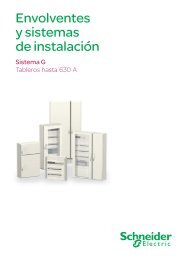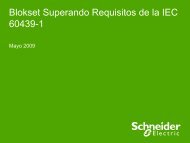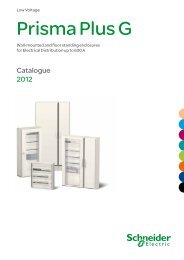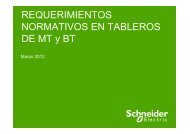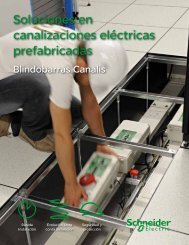Access to energy - Schneider Electric
Access to energy - Schneider Electric
Access to energy - Schneider Electric
You also want an ePaper? Increase the reach of your titles
YUMPU automatically turns print PDFs into web optimized ePapers that Google loves.
<strong>Access</strong><br />
<strong>to</strong> <strong>energy</strong><br />
BipBop Programme
Contents<br />
<strong>Access</strong> <strong>to</strong> <strong>energy</strong><br />
Message from Jean-Pascal Tricoire ........................................................................ 3<br />
The issues at stake ................................................................................................... 4-7<br />
The requirements .................................................................................................... 8-9<br />
The players ............................................................................................................ 10-11<br />
<strong>Schneider</strong> <strong>Electric</strong>’s commitment ................................................................. 12-19<br />
<strong>Schneider</strong> <strong>Electric</strong> | Special May 2010 Feature: | <strong>Access</strong> Sustainable <strong>to</strong> <strong>energy</strong> Development | N°1 - May 2008 | <strong>Access</strong> <strong>to</strong> <strong>energy</strong>
Message from Jean-Pascal Tricoire<br />
Promoting access <strong>to</strong> <strong>energy</strong> for all,<br />
without endangering the climate – this is<br />
<strong>to</strong>day’s major challenge.<br />
We are at a turning point in the his<strong>to</strong>ry<br />
of our planet. Today, both public and private<br />
<strong>energy</strong> is at the very heart of Sustainable<br />
Development issues. 1.6 billion people<br />
throughout the world do not have access<br />
<strong>to</strong> <strong>energy</strong> and legitimately aspire <strong>to</strong> having<br />
the same equipment and services as the<br />
inhabitants of developed areas. Energy is<br />
everywhere, in transport, services, industry,<br />
education, health and housing. It irrigates<br />
our mature societies. Therefore, access<br />
for all <strong>to</strong> this resource remains one of the<br />
essential keys <strong>to</strong> sustainable economic<br />
development that is wellbalanced<br />
between mature and emerging countries.<br />
But increasing the world’s consumption of<br />
<strong>energy</strong> means endangering another collective<br />
resource: the climate. How can we face up<br />
<strong>to</strong> this paradox? How can we produce<br />
better, improve our <strong>energy</strong> efficiency and<br />
promote access <strong>to</strong> <strong>energy</strong> for all?<br />
This is the major challenge facing us <strong>to</strong>day.<br />
<strong>Schneider</strong> <strong>Electric</strong>’s different professions,<br />
its world-wide set-up and the exceptional<br />
cultural diversity of its teams endow it with a<br />
special responsibility in this regard. It is our<br />
ambition <strong>to</strong> become an ac<strong>to</strong>r in a virtuous<br />
circle that links business, innovation and<br />
responsibility. The emerging countries are<br />
our markets of <strong>to</strong>morrow. Today, imagining an<br />
offer suited <strong>to</strong> people at “the base of the<br />
pyramid*”, means contributing <strong>to</strong> their<br />
development and preparing our common<br />
future at the same time. As far as innovation<br />
is concerned, it is now more essential<br />
than ever that we succeed in inventing new<br />
technologies and new services adapted<br />
<strong>to</strong> different realities, capable of reconciling<br />
performance and environmental respect.<br />
Lastly, the responsibility dimension of our<br />
action goes back a very long way. With the<br />
<strong>Schneider</strong> <strong>Electric</strong> Foundation, we have<br />
been involved for many years in educational<br />
activities and integration of young people<br />
throughout the world.<br />
This special feature aims <strong>to</strong> go even further<br />
and introduce you <strong>to</strong> all the issues<br />
related <strong>to</strong> <strong>energy</strong> access, and the<br />
sustainable solutions we are deploying<br />
<strong>to</strong> face up <strong>to</strong> them.<br />
Jean-Pascal<br />
Tricoire<br />
Chairman of the<br />
Management Board<br />
and CEO<br />
* The expression “base of the pyramid” is often used these days <strong>to</strong> refer <strong>to</strong> people with the lowest income on a global scale<br />
in a given country.<br />
2-3
<strong>Access</strong> <strong>to</strong> <strong>energy</strong>,<br />
a challenge for our<br />
global village<br />
<strong>Schneider</strong> <strong>Electric</strong> | May 2010 | <strong>Access</strong> <strong>to</strong> <strong>energy</strong>
The issues at stake<br />
<strong>Access</strong> <strong>to</strong> <strong>energy</strong> is already an issue for countries<br />
in the Southern hemisphere. It is also a real collective challenge<br />
closely related <strong>to</strong> the question of pollution and global warming.<br />
Today, almost a quarter of the world’s<br />
population does not have access <strong>to</strong><br />
electricity, despite all the progress made in<br />
certain regions. Certain countries, which have<br />
a high proportion of “poor”, such as China,<br />
are capable of supplying the majority of their<br />
population with electricity. Others have<br />
successfully launched rural electrification<br />
programmes, such as Bangladesh where<br />
some seventy electrification cooperatives<br />
have been created over the last twenty years<br />
and which now supply electricity <strong>to</strong> 40 million<br />
people, or Brazil, where new innovative<br />
projects have enabled new genera<strong>to</strong>rs<br />
operating on palm oil <strong>to</strong> be introduced in<strong>to</strong><br />
rural communities. But requirements are still<br />
considerable, especially in sub-Saharan<br />
Africa and Southern Asia. Furthermore,<br />
these requirements are evolving. Today,<br />
4 out of 5 persons without access <strong>to</strong><br />
electricity live in a rural area, but <strong>to</strong>morrow<br />
the question will also arise in urban areas.<br />
During the next thirty years the major part<br />
of the world’s demographic growth will take<br />
place in large urban agglomeration in<br />
developing countries.<br />
Due simply <strong>to</strong> their size and their increasing importance in world <strong>energy</strong><br />
markets, China and India are transforming the world’s <strong>energy</strong> system. Rapid<br />
economic growth will undoubtedly continue <strong>to</strong> sustain the demand for <strong>energy</strong> in<br />
these two countries and really contribute <strong>to</strong> improving the quality of life of over<br />
2 billion people. This is a legitimate aspiration that the rest of the world must<br />
integrate and support.<br />
Nobuo Tanaka, IEA executive direc<strong>to</strong>r<br />
>60%<br />
This represents the increase in the<br />
demand for electricity in developing<br />
countries by 2030.<br />
Source : IAE 2007.<br />
>47%<br />
This is the amount of CO 2<br />
emissions that<br />
can be attributed <strong>to</strong> developing countries<br />
by 2030.<br />
Source : IAE 2007.<br />
4-5
Energy, the key <strong>to</strong> development<br />
Since the Rio de Janeiro summit, access <strong>to</strong><br />
<strong>energy</strong> has been considered as an essential<br />
element for mankind’s sustainable<br />
development. It is a fact that providing<br />
modern <strong>energy</strong> services (heat for cooking,<br />
refrigeration, lighting, etc.) not only enables<br />
people’s quality of life <strong>to</strong> be improved,<br />
but it also destroys the circle of poverty by<br />
improving the efficiency of health and<br />
educational services, by developing mobility<br />
and by promoting the development of local<br />
crafts, industry and urban services. <strong>Access</strong><br />
<strong>to</strong> these services, no matter how modest it<br />
may be, has positive direct and indirect<br />
consequences, which contribute significantly<br />
<strong>to</strong> development. For example, a community’s<br />
or a region’s simple ability <strong>to</strong> pump water<br />
by means of electric pumps gives access <strong>to</strong><br />
drinking water, improves crop yields and<br />
increases food supplies. Women and girls<br />
can devote the time they used <strong>to</strong> spend<br />
going <strong>to</strong> and from the well <strong>to</strong> learning<br />
a professional activity. In other words,<br />
favouring more equitable access <strong>to</strong> <strong>energy</strong><br />
means taking an extra step <strong>to</strong>wards<br />
attaining the Millennium Development Goals<br />
defined by the United Nations’ General<br />
Assembly in 2000 for solving problems<br />
of extreme poverty.<br />
Developing countries should not be condemned by the weight of<br />
tradition or their poverty <strong>to</strong> repeat the same errors as their predecessors,<br />
especially when other solutions are available. We cannot refuse them the right<br />
<strong>to</strong> become industrialised and, in fact, they will need <strong>to</strong> practically double<br />
their production of electricity in the coming years if they want <strong>to</strong> progress and<br />
attain Millennium Development Goals.<br />
Kofi Annan, at the 14 th session<br />
of the UNO Sustainable Development Commission in 2006<br />
<strong>Schneider</strong> <strong>Electric</strong> | May Special 2010 Feature: | <strong>Access</strong> Sustainable <strong>to</strong> <strong>energy</strong> Development | N°1 - May 2008 | <strong>Access</strong> <strong>to</strong> <strong>energy</strong>
The issues at stake<br />
The base of the pyramid, a growth reservoir<br />
The base of the pyramid represents the 4 billion people on our planet who live on less than<br />
2 dollars a day. In his book “The Fortune at the base of the pyramid: Eradicating poverty through<br />
profit”, C.K. Prahalad, a university professor and influential international consultant, proposes<br />
that this population is not considered as a burden but as an immense potential reservoir of<br />
consumers and entrepreneurs. And <strong>to</strong> meet the requirements of this target,<br />
he suggests t hat major companies should work hand-in-hand with Non-Governmental<br />
Organisations and local government authorities.<br />
Rapidly increasing requirements<br />
The other major issue for the coming years is<br />
that of the sudden increase in requirements.<br />
According <strong>to</strong> a scenario drawn up by<br />
the International Energy Agency (IEA) in the<br />
report it published in early November 2007<br />
(World Energy Outlook 2007), developing<br />
countries with the fastest economic and<br />
demographic growth should account for<br />
74% of the increase in the world’s primary<br />
<strong>energy</strong> consumption, 45% of which will be<br />
attributable <strong>to</strong> China and India. As a result,<br />
the IEA is urging all countries <strong>to</strong> undergo<br />
a transition, whose goal is <strong>to</strong> “decarbonise”<br />
<strong>energy</strong> in order <strong>to</strong> reduce CO 2<br />
emissions and<br />
<strong>to</strong> preserve the planet from the disastrous<br />
consequences of global warming.<br />
Therefore, a new balance must be found<br />
between goals that are often contradic<strong>to</strong>ry:<br />
human development, economic growth and<br />
environmental respect. Without any doubt,<br />
this will involve a profound and “virtuous”<br />
modification of the living pattern of the people<br />
who inhabit the Northern hemisphere and<br />
a search for alternative <strong>energy</strong> production<br />
solutions in the Southern countries.<br />
6-7
Today, 1.6 billion persons throughout the world,<br />
or 300 million families, do not have access <strong>to</strong> electricity.<br />
World map with captions showing the regions where requirements<br />
are greatest.<br />
Source : International Energy Agency, 2006.<br />
2002 2030<br />
Africa<br />
Less than 10% of the population living<br />
in West Africa has access <strong>to</strong> electricity.<br />
In rural and peri-urban areas, electricity<br />
connection rates rarely exceed 5%<br />
compared with 35% in North Africa and<br />
45% in Eastern Asia.<br />
> In sub-Saharan Africa, 526 million<br />
people do not have access <strong>to</strong> electricity.<br />
<strong>Schneider</strong> <strong>Electric</strong> | Special May 2010 Feature: | <strong>Access</strong> Sustainable <strong>to</strong> <strong>energy</strong> Development | N°1 - May 2008 | <strong>Access</strong> <strong>to</strong> <strong>energy</strong>
The requirements<br />
Asia<br />
Primary <strong>energy</strong> requirements in Asia should increase by<br />
8% <strong>to</strong> 10% over the first 30 years of the 21st century. In 2004,<br />
the continent already represented 62% of the world’s growth<br />
in <strong>energy</strong> consumption (source: Enerdata).<br />
> Almost 900 million people still do not have access <strong>to</strong><br />
electricity, particularly in South-East Asia.<br />
>$15<br />
This the average monthly <strong>energy</strong> budget for the poorest families,<br />
which represent 30% of their overall income.<br />
8-9
The players<br />
In every area of the world, there are programmes,<br />
non-governmental organisations and private companies<br />
endeavouring <strong>to</strong> promote access <strong>to</strong> <strong>energy</strong>.<br />
Non-governmental Organisations<br />
A certain number of NGOs are working, more<br />
or less exclusively, on questions related <strong>to</strong><br />
<strong>energy</strong>. <strong>Electric</strong>iens Sans Frontières was<br />
created in 1986 by employees in the Design<br />
and Research Department of EDF (<strong>Electric</strong>ité<br />
de France). Today, this NGO has federated<br />
a dozen regional associations with over<br />
800 voluntary workers, mostly from EDF.<br />
Over 20 years, more than a million people<br />
have benefitted from the association’s actions.<br />
The E8 was created just after the Rio summit<br />
in 1992. This NGO has united 9 of the largest<br />
electricity concerns in the G8 countries.<br />
Since 1992, <strong>to</strong>gether with UN experts and local<br />
partners, it has completed five projects and<br />
is at present developing several programmes<br />
on renewable <strong>energy</strong> in the poorest areas in<br />
the world. Another example: the Habitat for<br />
Humanity NGO, which works on housing<br />
for the most poverty-stricken, is integrating<br />
notions of <strong>energy</strong> efficiency in its programmes<br />
and is developing solutions based on<br />
renewable <strong>energy</strong> in certain countries,<br />
such as Armenia, where it has equipped<br />
homes belonging <strong>to</strong> poor families with solar<br />
water heaters.<br />
<strong>Schneider</strong> <strong>Electric</strong> | May Special 2010 Feature: | <strong>Access</strong> Sustainable <strong>to</strong> <strong>energy</strong> Development | N°1 - May 2008 | <strong>Access</strong> <strong>to</strong> <strong>energy</strong>
The players<br />
International institutions<br />
For a number of years, numerous<br />
international programmes have been<br />
endeavouring <strong>to</strong> reduce the world’s <strong>energy</strong><br />
“divide”. With the support of 24 European,<br />
American and Asian countries, the African<br />
Development Bank (ADB) works in<br />
53 African countries. Notably, it has launched<br />
the Finesse programme (Financing Energy<br />
Services for Small-Scale Energy Users)<br />
intended <strong>to</strong> promote deployment of<br />
renewable-<strong>energy</strong>-based services in Africa.<br />
The objective of the World Bank’s ESMAP<br />
programme (Energy Sec<strong>to</strong>r Management<br />
Assistance Program), managed in<br />
partnership with the United Nations<br />
Development Programme, is <strong>to</strong> increase<br />
people’s access <strong>to</strong> modern <strong>energy</strong> sources,<br />
especially in isolated rural areas.<br />
The EUEI, the European Union Energy<br />
Initiative for “the eradication of poverty and<br />
sustainable development”, was launched<br />
in 2002 at the Earth Summit and obtained<br />
a joint commitment from the member states<br />
and the commission. Lastly, the United<br />
Nations Environmental Programme REED –<br />
Rural Energy Enterprise Development –<br />
acts as an incuba<strong>to</strong>r for enterprises and as<br />
a business angel. It supplies funds <strong>to</strong><br />
companies in the form of a debt or shares,<br />
enhances the value of the most profitable<br />
projects and withdraws once the company<br />
has become viable. It also acts as an advisor<br />
by making qualified personnel available <strong>to</strong><br />
entrepreneurs.<br />
Private companies<br />
In the context of their social responsibilities,<br />
certain large companies in the <strong>energy</strong> sec<strong>to</strong>r<br />
also endeavour <strong>to</strong> promote access <strong>to</strong> <strong>energy</strong><br />
for people living in developing countries.<br />
A member of the E8, EDF is participating in<br />
several projects piloted by the E8 NGO<br />
throughout the world. Its EDF <strong>Access</strong><br />
programme is a long term programme for<br />
creating and running local companies for<br />
selling <strong>energy</strong> services <strong>to</strong> rural populations in<br />
developing countries, far away from power<br />
grids. In 2003, in partnership with the WWF,<br />
ABB launched an “access <strong>to</strong> electricity in<br />
Tanzania” programme, whose aim is <strong>to</strong><br />
equip rural villages with installations that run<br />
on biomass fuel. In India, General <strong>Electric</strong><br />
is deploying a rural electrification programme<br />
that incorporates a certain number of<br />
technologies from the GE renewable <strong>energy</strong><br />
portfolio. This year, the American giant has<br />
set up a partnership with USAID and has<br />
committed itself <strong>to</strong> giving support <strong>to</strong> two<br />
initiatives made by the Indian government:<br />
“<strong>Electric</strong>ity for all by 2012” and “Rural<br />
electrification / Rural business clusters”.<br />
For more<br />
www.iea.org<br />
www.ademe.fr<br />
www.un.org/french/millenniumgoals/<br />
www.ckprahalad.com<br />
www.electriciens-sans-frontieres.org<br />
www.e8.org<br />
www.habitat.org<br />
www.afdb.org<br />
www.esmap.org<br />
www.areed.org<br />
www.panda.org<br />
10-11
<strong>Schneider</strong> <strong>Electric</strong>’s<br />
commitment<br />
The "BipBop*" programme<br />
Business<br />
Partner with<br />
investment funds<br />
<strong>to</strong> create<br />
companies<br />
dedicated <strong>to</strong> the<br />
electrical business<br />
for the Base of the<br />
Pyramid.<br />
B<br />
BOP<br />
P<br />
I<br />
Innovation<br />
Build adequate<br />
offers/solutions <strong>to</strong><br />
be a champion in the<br />
electrical distribution<br />
field fot the Base of<br />
the Pyramid.<br />
Support from<br />
<strong>Schneider</strong> <strong>Electric</strong><br />
Foundation<br />
People<br />
Train young people from the Base of the<br />
Pyramid in electrical skills, sponsor them.<br />
BOP for “Base of the pyramid“. It is the expression commonly used <strong>to</strong> name<br />
those with the lowest income in each country.<br />
* BipBop is the name of an internal <strong>Schneider</strong> <strong>Electric</strong> programme.<br />
<strong>Schneider</strong> <strong>Electric</strong> | May 2010 | <strong>Access</strong> <strong>to</strong> <strong>energy</strong>
<strong>Schneider</strong> <strong>Electric</strong>’s commitment<br />
For many years, <strong>Schneider</strong> <strong>Electric</strong> has been committed<br />
<strong>to</strong> a sustainable development approach. Today, the Group is passing<br />
a new miles<strong>to</strong>ne by linking business, responsibility and innovation even<br />
more closely <strong>to</strong>gether.<br />
By incorporating Sustainable Development<br />
objectives and indica<strong>to</strong>rs in its successive<br />
company programme, <strong>Schneider</strong> <strong>Electric</strong><br />
had already placed Sustainable Development<br />
at the heart of its strategy. “But <strong>to</strong>day,<br />
we are going even further”, explains<br />
Gilles Vermot Desroches, Sustainable<br />
Development Senior VP, <strong>Schneider</strong> <strong>Electric</strong>,<br />
“by treating three problems, Business,<br />
Innovation and People at the base<br />
of the pyramid, in an integrated way, in<br />
other words, by creating an offer adapted <strong>to</strong><br />
the requirements of populations at the base of<br />
the pyramid (the innovation dimension),<br />
by investing in innovative companies<br />
(the business dimension) and by increasing<br />
the levels of qualification<br />
of base of the pyramid populations”<br />
(the people dimension).<br />
Virtuous dynamics<br />
Associating these three dimensions <strong>to</strong>gether<br />
means creating “virtuous dynamics”.<br />
In this approach, increasing populations’<br />
technical skills enables us <strong>to</strong> find better<br />
qualified labour, <strong>to</strong> improve servicing and<br />
maintenance and <strong>to</strong> distribute offers for<br />
the base of the pyramid market more rapidly.<br />
Also, acquiring administration and<br />
management skills enables us <strong>to</strong> minimise<br />
financial risks, <strong>to</strong> optimise company strategy<br />
and <strong>to</strong> increase return-on-investment levels<br />
(which can then be reinvested elsewhere<br />
and thereby accelerate the “access <strong>to</strong> <strong>energy</strong>”<br />
process). Improving the quality of an offer<br />
(and its appropriateness <strong>to</strong> the demand)<br />
enables us <strong>to</strong> generate the resources<br />
needed <strong>to</strong> finance a training programme and<br />
<strong>to</strong> train populations on an offer that is suited<br />
<strong>to</strong> them (easy <strong>to</strong> use, <strong>to</strong> service, <strong>to</strong> exploit, etc).<br />
Lastly, investment in innovative companies<br />
stimulates the emergence of new ideas<br />
and offers that are increasingly accessible,<br />
approachable, and viable for the base of<br />
the pyramid”.<br />
>Over $430 billion<br />
Per year, this is the estimated size of the “household” <strong>energy</strong> market in the base<br />
of pyramid consumer segment, where annual income is less than 3,000 dollars.<br />
Source: International Finance Corporation, “The next 4 billion, market size and business strategy at the base of the pyramid”, World<br />
Resources Institute, 2007.<br />
12-13
Innovation<br />
Low-income markets, pretty unattractive?<br />
Taking an interest in it <strong>to</strong>day means preparing for the future.<br />
>1<br />
million:<br />
households at the<br />
Base of the Pyramid<br />
have access <strong>to</strong><br />
<strong>energy</strong> thanks <strong>to</strong><br />
<strong>Schneider</strong> <strong>Electric</strong>’s<br />
solutions at the end<br />
of 2011<br />
Prepayment, a solution suited<br />
<strong>to</strong> the requirements of developing<br />
countries<br />
Today, the Group’s offer in terms of access <strong>to</strong><br />
<strong>energy</strong> is mainly borne by Conlog, it subsidiary<br />
set up in South Africa, a company that joined<br />
the Group in 2000. In many emerging<br />
countries, electricity opera<strong>to</strong>rs have difficulty<br />
in managing payment of their invoices.<br />
Conlog’s prepayment solutions (installing<br />
counters in homes, setting up a network of<br />
prepayment card sales points and a<br />
management system on the <strong>energy</strong> opera<strong>to</strong>r’s<br />
premises) provide an efficient solution <strong>to</strong> this<br />
problem. There are numerous advantages <strong>to</strong><br />
this system: the opera<strong>to</strong>r obtains significant<br />
cash flow and can save the cost of a<br />
traditional invoice management system. On<br />
the consumer side, access <strong>to</strong> <strong>energy</strong> is<br />
simplified, without any extra cost for<br />
subscriptions or cancelling subscriptions, and<br />
managing <strong>energy</strong> budgets becomes easier:<br />
you only consume what you can pay for. In<br />
the Sudan, Conlog has installed a million<br />
counters of this type for the national<br />
electricity opera<strong>to</strong>r. In South Africa, the same<br />
number of counters has been installed for<br />
Eskom, a local electricity production and<br />
distribution company.<br />
The low cost housing market<br />
The offer developed by <strong>Schneider</strong> <strong>Electric</strong><br />
in South Africa follows the same logic. Since<br />
1994, with the “A home for all” government<br />
programme, 1.4 million low-cost homes have<br />
been built, putting a roof over the heads of<br />
some 5 million people, amongst the poorest<br />
in the country. <strong>Schneider</strong> <strong>Electric</strong> has set up a<br />
partnership with a local company, Sonoco,<br />
created by the former South-African football<br />
star, Jomo Sono, for equipping these homes<br />
whose technical characteristics are all very<br />
similar. Sonoco installs kits which include<br />
everything required by a basic household<br />
electricity installation; it sells prepayment<br />
cards <strong>to</strong> the occupants, operates prepayment<br />
services and handles system maintenance.<br />
The kits developed by <strong>Schneider</strong> <strong>Electric</strong> are<br />
very easy <strong>to</strong> fit (one hour’s fitting on average),<br />
which also provides a solution <strong>to</strong> the problem<br />
of local installers’ technical skills.<br />
<strong>Schneider</strong> <strong>Electric</strong> | May 2010 | <strong>Access</strong> <strong>to</strong> <strong>energy</strong>
<strong>Schneider</strong> <strong>Electric</strong>’s commitment<br />
In-Diya LED-based lighting system in<br />
India<br />
As part of its commitment <strong>to</strong>wards the BipBop<br />
initiative, <strong>Schneider</strong> <strong>Electric</strong> unveiled its<br />
In-Diya LEDbased lighting system in New<br />
Delhi in February 2010. In-Diya aims <strong>to</strong><br />
provide lighting <strong>to</strong> people living with no or<br />
unreliable electricity in India. It is a specially<br />
designed LED-based lighting system that can<br />
operate on main supply and/or solar, and<br />
provides backup ranging from 8 <strong>to</strong> 15 hours<br />
for indoor applications. The innovative offer<br />
will play a key role in providing access <strong>to</strong><br />
reliable lighting <strong>to</strong> more than 500 million rural<br />
people, thereby enabling them <strong>to</strong> take part in<br />
the exclusive growth s<strong>to</strong>ry in India.<br />
In-Diya is a high-quality, affordable product<br />
offering the following benefits:<br />
> consumes 50% less power than an<br />
11-watt compact fluorescent lamp (CFL)<br />
and 90% less power than two 60-watt<br />
incandescent lamps for the same light<br />
output<br />
> illuminates a 3.65m x 3.65m (12’ x 12’)<br />
room for all normal activities and is<br />
wall-mounted<br />
> in its high-end version, costs less than<br />
any CFL-based solar home lighting<br />
system<br />
> provides 50 000 hours of lighting<br />
Half of the net profit earned from the sales of<br />
In-Diya in India will be put back in<strong>to</strong> the<br />
<strong>Schneider</strong> <strong>Electric</strong> India Foundation <strong>to</strong> further<br />
the cause of BipBop.<br />
Also in India, the <strong>Schneider</strong> <strong>Electric</strong><br />
Foundation contributed <strong>to</strong> project iLead<br />
(Institute for Livelihood, Educations, and<br />
Development). The project consists of skill<br />
development, training, and employment for<br />
disadvantaged young people, as well as<br />
entrepreneurship training for poor youth. A<br />
pilot class of electricians started training in<br />
2009. The goal is <strong>to</strong> train 4000 professionals in<br />
six different locations by 2012, after which<br />
they will be encouraged <strong>to</strong> launch their own<br />
small business and deploy lighting solutions<br />
in poor villages throughout the country .<br />
LED lamp with battery backup<br />
The innovative offer will play a key role in providing<br />
access <strong>to</strong> reliable lighting <strong>to</strong> more than 500 million people.<br />
Abhimanyu Sahu, Programme Manager, BipBop India, <strong>Schneider</strong> <strong>Electric</strong><br />
14-15
Business<br />
<strong>Schneider</strong> <strong>Electric</strong> Energy <strong>Access</strong> Fund<br />
The establishment of the <strong>Schneider</strong> <strong>Electric</strong><br />
Energy <strong>Access</strong> fund marked an innovative first<br />
for a major industrial company in the area of<br />
corporate social responsibility. Created with<br />
the backing of Crédit Coopératif and PhiTrust,<br />
the fund supports the development of<br />
entrepreneurial initiatives worldwide that will<br />
help the poorest among us obtain access <strong>to</strong><br />
<strong>energy</strong>. With an initial capitalization of ¤3<br />
million, <strong>Schneider</strong> <strong>Electric</strong> Energy <strong>Access</strong><br />
provides financing for projects that are<br />
designed <strong>to</strong>:<br />
> help jobless individuals create<br />
businesses in electricity<br />
> promote the development of businesses<br />
that provide <strong>energy</strong> access in rural<br />
orsuburban areas<br />
> support the deployment of innovative<br />
<strong>energy</strong> access solutions that use<br />
renewable energies for the Base of the<br />
Pyramid<br />
<strong>Schneider</strong> <strong>Electric</strong> Energy <strong>Access</strong> fund works<br />
within the company’s BipBop Programme <strong>to</strong><br />
provide safe, green <strong>energy</strong> <strong>to</strong> disadvantaged<br />
individuals. The structure of the fund, which is<br />
designed <strong>to</strong> promote responsible<br />
development, represents anoriginal and<br />
innovative response <strong>to</strong> the latest French<br />
legislation on employee savings. It is a new<br />
societal commitment for <strong>Schneider</strong> <strong>Electric</strong>,<br />
shared with our entire corporate community.<br />
By supporting the development of businesses<br />
involved in electricity and renewable<br />
energies, <strong>Schneider</strong> <strong>Electric</strong> Energy <strong>Access</strong><br />
reflects our commitment <strong>to</strong> creating a<br />
virtuous circle combining business,<br />
innovation, and social responsibility.<br />
<strong>Schneider</strong> <strong>Electric</strong> | Special May 2010 Feature: | <strong>Access</strong> Sustainable <strong>to</strong> <strong>energy</strong>Development | N°1 - May 2008 | <strong>Access</strong> <strong>to</strong> <strong>energy</strong>
<strong>Schneider</strong> <strong>Electric</strong>’s commitment<br />
People<br />
The <strong>Schneider</strong> <strong>Electric</strong> Foundation supports projects all over the world<br />
<strong>to</strong> promote access <strong>to</strong> <strong>energy</strong> and professional integration in<strong>to</strong> electrical<br />
trades.<br />
Over the past 10 years, the <strong>Schneider</strong> <strong>Electric</strong> Foundation has supported hundreds of<br />
children and young people in all of the Group’s host countries. The most ambitious projects<br />
combine financial and human resources with a link <strong>to</strong> <strong>Schneider</strong> <strong>Electric</strong>’s businesses.<br />
Jobs in electricity<br />
The Group has decided <strong>to</strong> focus more fully<br />
on jobs in electricity <strong>to</strong> give its commitment<br />
more meaning and make its programs<br />
more effective. Around the world, wherever<br />
disconnected people are looking for job<br />
opportunities, the Foundation will support<br />
projects that provide training and an on-ramp<br />
<strong>to</strong> long-term employment, especially in areas<br />
related <strong>to</strong> electricity.<br />
<strong>Access</strong> <strong>to</strong> <strong>energy</strong><br />
In <strong>to</strong>day’s world, 1.6 billion people do not<br />
have access <strong>to</strong> electricity. The Foundation<br />
wants <strong>to</strong> help shrink this gap by providing<br />
access <strong>to</strong> <strong>energy</strong>—a move that will also<br />
provide access <strong>to</strong> development and<br />
improved healthcare.<br />
>10.000<br />
young people at the Base of the Pyramid<br />
trained in the electricity professions at the<br />
end of 2011<br />
In India, from<br />
village <strong>to</strong> school<br />
In India, <strong>Schneider</strong><br />
<strong>Electric</strong> is involved<br />
in a project with<br />
the Kanyare Colony,<br />
a village located<br />
in the province<br />
of Kernataka.<br />
The project’s initial<br />
objective is <strong>to</strong> provide<br />
electricity <strong>to</strong> the<br />
village, which is the<br />
home of 150 families<br />
mainly earning their<br />
living by gathering<br />
fruit and vegetables<br />
and producing honey.<br />
The project’s second<br />
phase consists of<br />
training 20 young<br />
people in electrical<br />
trades; a training<br />
programme that will<br />
be extended <strong>to</strong><br />
a technical college<br />
located at Misore,<br />
the closest <strong>to</strong>wn.<br />
16-17
The Foundation in action<br />
Training future electricians in Brazil<br />
In Brazil, the national industrial training<br />
service (SENAI) is deploying an 80-hour<br />
training programme in close cooperation with<br />
<strong>Schneider</strong> <strong>Electric</strong> Brazil. Taught on nights and<br />
weekends, this initiation <strong>to</strong> the basics of<br />
residential electrical work gives low-income<br />
youths an opportunity <strong>to</strong> learn the electrical<br />
trade. Because the courses are offered free of<br />
charge and outside working hours, both<br />
attendance and the completion rate are high.<br />
In 2009, 1200 young people participated in<br />
the programme at 26 centres across the<br />
country.<br />
Hands-on experience in Nigeria<br />
From December 3-7, 2007, students at Yaba<br />
college of technology applied the electrical<br />
engineering lessons given by <strong>Schneider</strong> <strong>Electric</strong><br />
team members in a hands-on workshop.<br />
Participants were asked <strong>to</strong> verify and optimize<br />
the electrical installations at Child Life Line,<br />
a centre for the disadvantaged supported<br />
by <strong>Schneider</strong> <strong>Electric</strong> Nigeria, its employees<br />
and the Foundation.<br />
Afterwards, a training session on installation<br />
was offered that attracted nearly<br />
400 students and 70 professors from<br />
four Nigerian universities.<br />
<strong>Schneider</strong> <strong>Electric</strong> | Special May 2010 Feature: | <strong>Access</strong> Sustainable <strong>to</strong> <strong>energy</strong>Development<br />
| N°1 - May 2008 | <strong>Access</strong> <strong>to</strong> <strong>energy</strong>
<strong>Schneider</strong> <strong>Electric</strong>’s commitment<br />
Around the world<br />
> Algeria<br />
Atelier sans<br />
frontières<br />
Train disadvantaged<br />
young people<br />
<strong>to</strong> acquire the basic<br />
knowledge<br />
in electricity and<br />
electronics.<br />
> Brazil<br />
Sociedade<br />
Benfei<strong>to</strong>ra<br />
Jaguaré<br />
Build a new<br />
classroom, renovate<br />
another one, propose<br />
on-product training<br />
for the teachers a<br />
nd train 60 young<br />
disadvantaged<br />
people a year<br />
in electrical<br />
engineering.<br />
> Costa Rica<br />
Fundación<br />
Cedes don<br />
Bosco<br />
Train 38 young<br />
disadvantaged<br />
people and<br />
their teachers in<br />
electromechanical<br />
engineering,<br />
bringing brand<br />
new electrical<br />
equipment.<br />
> Egypt<br />
Galal Fahmi<br />
School<br />
Renovating a<br />
technical school,<br />
training the teachers<br />
and developing<br />
a training program<br />
for the pupils.<br />
> France<br />
Adie<br />
Providing financial<br />
assistance<br />
<strong>to</strong> 50 long-term<br />
unemployed<br />
persons <strong>to</strong> help<br />
them create<br />
their own companies<br />
in the field<br />
of electricity.<br />
> Indonesia<br />
2 Vocational<br />
schools et<br />
Nurani Dunia<br />
Renovate and equip<br />
the labora<strong>to</strong>ries<br />
at the technical<br />
schools in Banda<br />
Aceh.<br />
> Lebanon<br />
Seeds of Hope<br />
Partnering with the<br />
European Institute<br />
for Cooperation and<br />
Development (IECD)<br />
<strong>to</strong> upgrade training<br />
capacity at<br />
six technical schools<br />
specialized in<br />
electrical,<br />
electronic and<br />
electromechanical<br />
studies.<br />
> Central<br />
Africa<br />
The Feron Vrau<br />
foundation<br />
Giving social and<br />
financial support<br />
for the training<br />
of engineers and<br />
technicians<br />
(recruiting and<br />
training teaching<br />
staff, purchasing<br />
technical, scientific<br />
and classroom<br />
equipment).<br />
> Russia<br />
University for<br />
Handicapped<br />
people<br />
Create a University<br />
for handicapped<br />
people, with<br />
courses, selection<br />
and exams and<br />
delivery of a<br />
<strong>Schneider</strong> <strong>Electric</strong><br />
diploma.<br />
> Turkey<br />
Cagdas Yasami<br />
Destekleme<br />
Dernegi<br />
Provide financial<br />
support for<br />
50 young women<br />
<strong>to</strong> enable them<br />
<strong>to</strong> continue their<br />
studies in electrical<br />
and electronic<br />
engineering.<br />
18-19
<strong>Schneider</strong> <strong>Electric</strong> SA<br />
Sustainable Development Department<br />
35, rue Joseph Monier<br />
92506 Rueil-Malmaison - France<br />
Tél : +33 (0) 1 41 29 70 00<br />
Fax : +33 (0) 1 41 29 71 00<br />
<strong>Schneider</strong> <strong>Electric</strong> | Special Feature: Sustainable Development | N°1 - May 2008 | <strong>Access</strong> <strong>to</strong> <strong>energy</strong><br />
Butterfly - Crédits pho<strong>to</strong>s : Agence VU, Etienne Eymard Duvernay, Christian Rausch, <strong>Schneider</strong> <strong>Electric</strong>.






